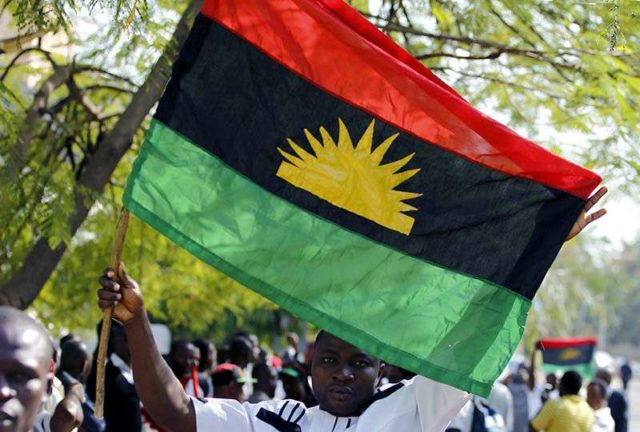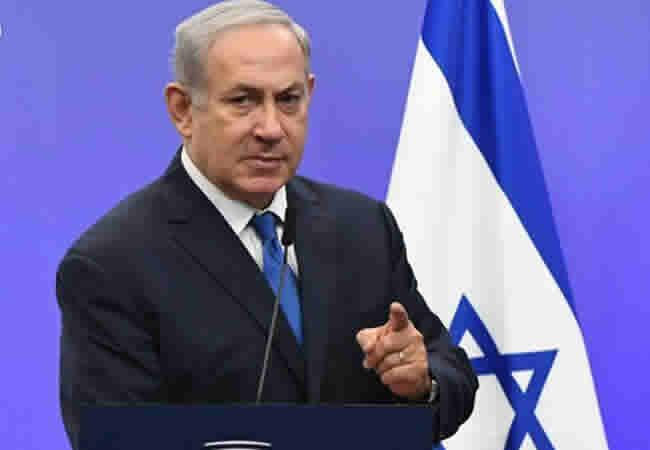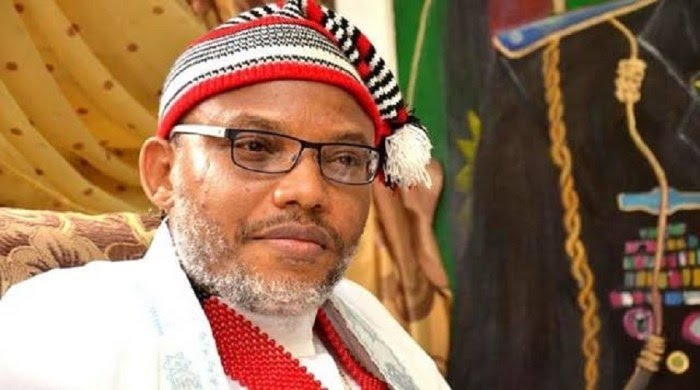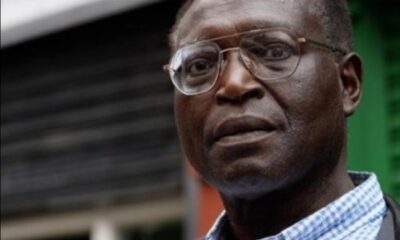Headline
IPOB: Why FG Can’t Reveal How Nnamdi Kanu Was Extradited -Lawyer
Published
2 years agoon
By
Editor
Aloy Ejimakor, Special Counsel for the detained leader of the Indigenous People of Biafra, Nnamdi Kanu, has challenged the Nigerian government to reveal how the IPOB leader was arrested and extradited.
In a statement on Monday, Ejimakor described the extradition of Kanu as illegal and a “gross misconduct”.
The statement was titled, ‘Absence of lawful extradition is the reason why Nigeria cannot explain how it intercepted Nnamdi Kanu’.
Kanu, who is facing an 11-count charge of treason, treasonable felony, terrorism, and illegal possession of firearms, among others, allegedly jumped bail in 2017 and left the country, only to re-emerge in Israel and then in the United Kingdom.
The former London estate agent was rearrested in June 2021. He was initially arrested in late 2015 after calling for a separate state for Biafra, in South-East Nigeria.
He was re-arraigned before a Federal High Court in Abuja and ordered to be remanded in the custody of the DSS, while the case was adjourned.
Following the sudden appearance of Kanu in a Federal High Court in Abuja on June 29, 2021, the Attorney-General of Nigeria, Abubakar Malami, SAN, at a press conference, stated that Kanu was “intercepted through the collaborative efforts of Nigerian intelligence and Security Services”.
But the lawyer complained that beyond “the bland use of the word ‘interception’, neither the Attorney-General nor any other Nigerian official has explained how and where this infamous interception occurred or whether it occurred under the pertinent legal framework or not”.
READ ALSO: IPOB Ban: Northern Traders Threaten To Stop Sales Of Cattle, Onions, Foodstuff In Southeast
He said, “From published accounts, all efforts by the media (domestic and international) to elicit details of this interception have met a stubborn official silence. And it appears that the same is true with myriad diplomatic inquiries issuing to Nigeria from the international community, notably from the United Kingdom and United Nations.
“Conversely, Nnamdi Kanu had, in various sworn statements, given credible accounts and details that prove that the so-called interception is simply that he was officially kidnapped, disappeared, tortured in Kenya, and extraordinarily renditioned to Nigeria. During the hearing of Kanu’s fundamental rights suit in Abia State (which he won), the Nigerian government could not explain how Kanu ended up in Nigeria, thus confirming that Kanu was not extradited but illegally renditioned. If Kanu was extradited, the Nigerian government would have been very forthright with it, especially given the insurmountable prosecutorial barrier that comes with extraordinary rendition.
“It is therefore instructive that, to date, the Nigerian government has neither – in court or public – contradicted Kanu’s accounts, nor offered any alternative account that may suggest that Kanu’s return to Nigeria was secured through some due process of law.
“On its part, the Kenyan Government has, in the public and in processes filed in court, vehemently denied that Kanu was subjected to any extradition (or even deportation) proceedings in Kenya; and Nigeria has deadpanned to Kenya’s self-righteous denials.
“To be sure, Nnamdi Kanu, a non-national of Kenya, was legally admitted to Kenya on 5th May, 2021 and then expelled or was transferred from Kenya to Nigeria on 27th June, 2021 without ‘a decision taken in accordance with the law’. Both Nigeria and Kenya are State Parties to the parent African Charter that grandfathered the similar law Nigeria later domesticated into its municipal laws.
“It is trite that a renditioned fugitive suspect cannot be subjected to trial. Thus, Mazi Nnamdi Kanu should be restitutioned or restored to the status quo, whether to Kenya or Britain, at his option. It is inherently contradictory to postulate that a renditioned suspect will get a fair trial from the jurisdiction that renditioned him.
“By its infamous nature, extraordinary rendition destroys every prospect for a fair trial. Therefore, the next best thing for Nigerian authorities to do is to toe the path of honor and contrition by releasing Nnamdi Kanu unconditionally. In the interim, it may choose the easier option of forbearing any objections to reinstatement of Nnamdi Kanu’s bail, which will instantly clear the judicial path to his release.
“Going forward, the authorities can be guided by the recent judgment of the Abia State High which exonerated Kanu from the supervening event that disquieted his bail and ultimately culminated in the extraordinary rendition.”
(PUNCH)
You may like


Troops Kill 20 IPOB Members, Destroy ‘Supreme Headquarters’


Kanu’s Release Tops Agenda As Obasanjo Meets Ohanaeze Leaders


Supreme Court’s Refusal To Free Kanu Is Rape Of Justice – MASSOB


Imo Police Arrest 18 IPOB, ESN Suspects Over Killing Of DPO, Inspector


IPOB Goes Spiritual, Organises Prayers For Nnamdi Kanu


JUST IN: Stop Tagging Us Terrorists, IPOB Tells FG

Iran on Saturday hanged at least seven people, including two women, while a member of its Jewish minority is at imminent risk of execution as the Islamic Republic further intensified its use of capital punishment, an NGO said.
Parvin Mousavi, 53, a mother of two grown-up children, was hanged in Urmia prison in northwestern Iran along with five men convicted in various drug-related cases, the Norway-based Iran Human Rights (IHR) said in a statement.
In Nishapur in eastern Iran, a 27-year-old woman named Fatemeh Abdullahi was hanged on charges of murdering her husband, who was also her cousin, it said.
IHR says it has tallied at least 223 executions this year, with at least 50 so far in May alone. A new surge began following the end of Persian New Year and Ramadan holidays in April, with 115 people including six women hanged since then, it said.
READ ALSO: Burkina Faso, Mali, Niger Finalise Regional Alliance Project
Iran carries out more recorded executions of women than any other country. Activists say many such convicts are victims of forced or abusive marriages.
Iran last year carried out more hangings than in any year since 2015, according to NGOs, which accuse the Islamic republic of using capital punishment as a means to instill fear in the wake of protests that erupted in autumn 2022.
“The silence of the international community is unacceptable,” IHR director Mahmood Amiry-Moghaddam told AFP.
“Those executed belong to the poor and marginalised groups of Iranian society and didn’t have fair trials with due process.”
READ ALSO: Israeli Leaders Disagree Over Post-war Gaza Governance Amid US Pressure
‘Killing machine’
IHR said Mousavi had been in prison for four years. It cited a source as saying she had been paid the equivalent of 15 euros to carry a package she had been told contained medicine but was in fact five kilos of morphine.
“They are the low-cost victims of the Islamic Republic’s killing machine, which aims at instilling fear among people to prevent new protests,” added Amiry-Moghaddam.
The group meanwhile said a member of Iran’s Jewish community, which has drastically reduced in numbers in recent years but is still the largest in the Middle East outside Israel, was at imminent risk of execution over a murder charge.
Arvin Ghahremani, 20, was convicted of murder during a street fight when he was 18 and is scheduled to be executed in the western city of Kermanshah on Monday, it said, adding it had received an audio message from his mother Sonia Saadati asking for his life to be spared.
READ ALSO: 50-year-old Man Dies While Watching Football Match In Lagos Bar
His family is seeking to ask the family of the victim to forgo the execution in line with Iran’s Islamic law of retribution, or qesas.
Also at risk of execution is Kamran Sheikheh, the last surviving member of a group of seven Iranian Kurdish men who were first arrested between early December 2009 and late January 2010 and later sentenced to death for “corruption on earth” over alleged membership of extremist groups, it said.
Six men convicted in the same case have been executed in the last months almost one-and-a-half decades after their initial arrest, the last being Khosro Besharat who was hanged in Ghezel Hesar prison outside Tehran this week.
There has been an international outcry meanwhile over the death sentence handed out last month to Iranian rapper Toomaj Salehi, seen by activists as retaliation for his music backing the 2022 protests. His lawyers are appealing the verdict.
AFP
Headline
Israeli Leaders Disagree Over Post-war Gaza Governance Amid US Pressure
Published
8 hours agoon
May 18, 2024By
Editor
New divisions have emerged among Israel’s leaders over post-war Gaza’s governance, with an unexpected Hamas fightback in parts of the Palestinian territory piling pressure on Prime Minister Benjamin Netanyahu.
The Israeli army has been battling Hamas militants across Gaza for more than seven months while also exchanging near-daily fire with Iran-backed Hezbollah forces along the northern border with Lebanon.
But after Hamas fighters regrouped in northern Gaza, where Israel previously said the group had been neutralised, broad splits emerged in the Israeli war cabinet in recent days.
Netanyahu came under personal attack from Defence Minister Yoav Gallant for failing to rule out an Israeli government in Gaza after the war.
The Israeli premier’s outright rejection of post-war Palestinian leadership in Gaza has broken a rift among top politicians wide open and frustrated relations with top ally the United States.
Experts say the lack of clarity only serves to benefit Hamas, whose leader has insisted no new authority can be established in the territory without its involvement.
READ ALSO: 400 Bodies Found In Mass Grave In Gaza Hospital
“Without an alternative to fill the vacuum, Hamas will continue to grow,” International Crisis Group analyst Mairav Zonszein told AFP.
Emmanuel Navon, a lecturer at Tel Aviv University, echoed this sentiment.
“If only Hamas is left in Gaza, of course they are going to appear here and there and the Israeli army will be forced to chase them around,” said Navon.
“Either you establish an Israeli military government or an Arab-led government.”
US pressure
Gallant said in a televised address on Wednesday: “I call on Prime Minister Benjamin Netanyahu to make a decision and declare that Israel will not establish civilian control over the Gaza strip.”
The premier’s war planning also came under recent attack by army chief Herzi Halevi as well as top Shin Bet security agency officials, according to Israeli media reports.
READ ALSO: Israel Bombs Gaza, Fights Hamas Around Hospitals
Netanyahu is also under pressure from Washington to swiftly bring an end to the conflict and avoid being mired in a long counterinsurgency campaign.
Washington has previously called for a “revitalised” form of the Palestinian Authority to govern Gaza after the war.
But Netanyahu has rejected any role for the PA in post-war Gaza, saying Thursday that it “supports terror, educates terror, finances terror”.
Instead, Netanyahu has clung to his steadfast aim of “eliminating” Hamas, asserting that “there’s no alternative to military victory”.
Experts say confidence in Netanyahu is running thin.
“With Gallant’s criticism of Netanyahu’s failure to plan for the day after in terms of governing Gaza, some real fissures are beginning to emerge in the Israeli war cabinet,” Colin P. Clarke, director of policy and research at the Soufan Group think tank, wrote on X, formerly Twitter.
“I’m not sure I know of many people, including the most ardent Israel supporters, who have confidence in Bibi,” he said, using Netanyahu’s nickname.
READ ALSO: Fight-to-finish: Israel Deploys New Military AI In Gaza War
Hostage ‘impasse’
The Gaza war broke out after Hamas’s attack on southern Israel which resulted in the deaths of more than 1,170 people, mostly civilians, according to an AFP tally of Israeli official figures.
The militants also seized about 250 hostages, 125 of whom Israel estimates remain in Gaza, including 37 the military says are dead.
Israel’s military retaliation has killed at least 35,386 people, mostly civilians, according to the Hamas-run Gaza’s health ministry, and an Israeli siege has brought dire food shortages and the threat of famine.
Many Israelis supported Netanyahu’s blunt goals to seek revenge on Hamas in the aftermath of the October 7 attack.
But now, hopes have faded for the return of the hostages and patience in Netanyahu may be running out, experts said.
On Friday, the army announced it had recovered bodies of three hostages who were killed during the October 7 attack.
After Israeli forces entered the far southern city of Rafah, where more than a million displaced Gazans were sheltering, talks mediated by Egypt, the United States and Qatar to release the hostages have ground to a standstill.
“The hostage deal is at a total impasse — you can no longer provide the appearance of progress,” said Zonszein of the International Crisis Group.
“Plus the breakdown with the US and the fact that Egypt has refused to pass aid through Rafah — all those things are coming to a head.”
Headline
Burkina Faso, Mali, Niger Finalise Regional Alliance Project
Published
11 hours agoon
May 18, 2024By
Editor
Junta-run Burkina Faso, Mali and Niger have finalised plans to form a confederation after turning their backs on former colonial ruler France to seek closer ties with Russia.
Their foreign ministers met Friday in Niger’s capital Niamey to agree on a text establishing the Confederation of the Alliance of Sahel States (AES).
“The objective was to finalise the draft text relating to the institutionalisation and operationalisation of the Confederation of the Alliance of Sahel States (AES)”, said Niger Foreign Minister Bakary Yaou Sangare as he read the final statement late Friday.
READ ALSO: Court Jails Social Media Influencer For Celebrity Scam
He said the text would be adopted by the heads of state of the three countries at a summit, without specifying the date.
“We can consider very clearly, today, that the Confederation of the Alliance of Sahel States (AES) has been born,” Malian Foreign Minister Abdoulaye Diop said after meeting General Abdourahamane Tiani, the head of Nigerien military regime.
The third foreign minister at the meeting was Burkina Faso’s Karamoko Jean-Marie Traore.
READ ALSO: Tinubu Okays Payment Of N3.3tn Power Sector Debts, Gencos, Gas Producers To Get N1.3tn, $1.3bn
The Sahel region has been subject to deadly jihadist violence for years, which they accused France of not being able to curb.
The three countries said late January they were quitting The Economic Community of West African States (ECOWAS), which they said was under French influence, to create their own regional grouping.
AFP
Tragedy Struck In Osun As Three siblings, Mother Die In Auto Crash

Soldiers, Traders Clash In Abuja Market

Shettima Launches NEDC’s School Enrollment Drive Programme
Trending

 Entertainment4 days ago
Entertainment4 days agoVIDEO: Drama As Portable Jumps Gate To Evade Police Arrest

 Headline5 days ago
Headline5 days ago32-year-old Nigerian Doctor Killed In US, Father Mourns

 News5 days ago
News5 days agoMan Arrested For Invading Plateau Bank With Bomb

 News3 days ago
News3 days agoAbure Bows To Pressure, Begs NLC President For Reconciliation

 Headline4 days ago
Headline4 days agoPolice Give Tips On How To Report Erring Officers

 News2 days ago
News2 days agoUK Denies 74-year-old Mam Permanent Residency After 42 Years Stay

 News5 days ago
News5 days agoSee Lagos Environment Commissioner’s Funny Reply To Resident’s Complaint About Neighbours Moaning Loudly At Night

 Entertainment4 days ago
Entertainment4 days agoPolice Arrest Portable

 News3 days ago
News3 days agoSanwo-Olu’s Deputy Chief Of Staff Is Dead

 Headline4 days ago
Headline4 days agoKudos As Nigeria Gains Additional Territory ‘Five Times The Size Of Lagos’



























